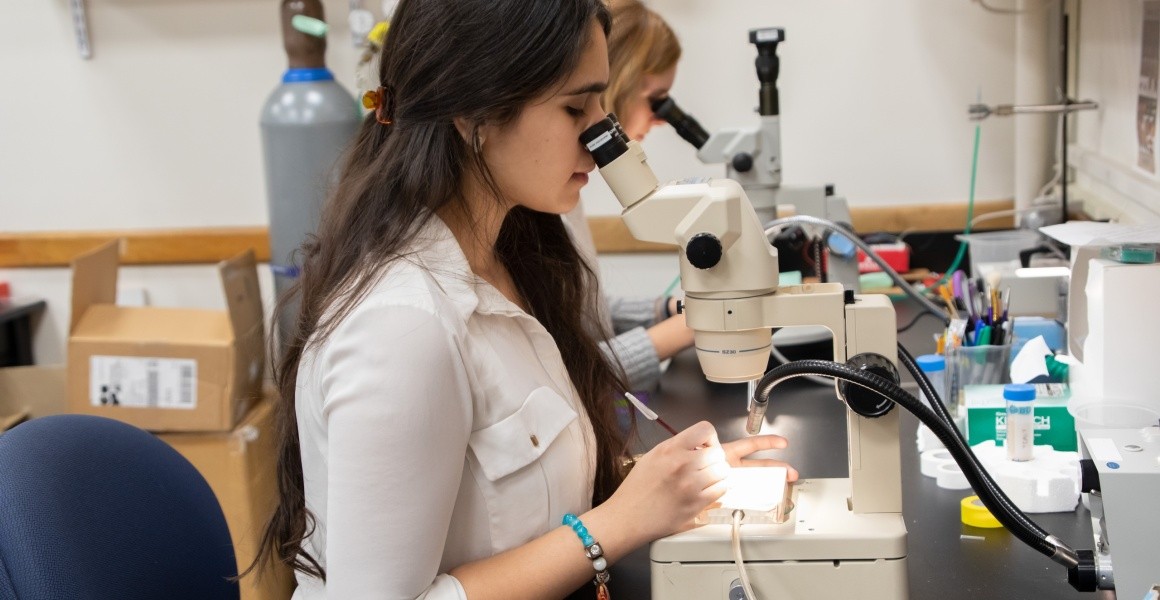NEURO-100 Introduction to Neuroscience and Behavior
This comprehensive survey course explores the brain and the biological basis of behavior. We will examine the anatomy of the nervous system and the unique properties of the cells that make up the brain. We will discuss the mechanisms by which individual brain cells communicate with each other, and how networks of cells underlie more complex processes such as perception, learning, memory, and behavior.
NEURO-221 Research Techniques in Neuroscience
This course will introduce students to modern techniques utilized in neuroscience research. Students will learn the underlying principles of an array of techniques spanning the fields of cellular/molecular, behavioral, and cognitive neuroscience. In lab, students will perform experiments that demonstrate these skills firsthand. Emphasis will be placed on the tools necessary to implement these studies, proper experimental design, and the critical interpretation of generated data.
NEURO-246 Cognitive Neuroscience
Cognitive psychologists investigate the features and functions of the human mind through behavioral techniques; neuroscientists explore the physiology of the human brain. Cognitive Neuroscience lies at the intersection of these disciplines, and asks questions like: How are memories represented in the brain? Is our brain pre-prepared to learn language and if so, how? How does the average human brain still outperform most face recognition software? This course explores the cognitive and neural processes that support vision, attention, language, memory, and music. It introduces basic neuroanatomy, functional imaging techniques, and behavioral measures of cognition.
NEURO-254 Psychopharmacology
Psychopharmacology focuses on the impact that drugs (both illicit and prescription) have on the brain, neurocircuitry, and behavior. Students will explore the underlying neurotransmitter systems of the brain and discover how substances influence nervous system function including the experience of pain, sleep, emotional states, motivation, addiction, and mental health. The course will bridge concepts in chemistry, biology, psychology, and neuroscience by highlighting major drug classes and their underlying mechanisms of action. Additional discussions will focus on the economic, social, and political aspects of the drug market, as well as ethics and legalities of the drug industry.
NEURO-256 Hormones and Behavior
Does the idea of Finals Week stress you out? Have you ever felt hungry or thirsty? Is our biology to blame when people cheat on their partners? From mental health and hunger to sexual motivation and aggression, our hormones dictate many of our basic choices and ultimately control how we interact with our world. This course will explore how hormones communicate with our brain to influence behaviors such as sexual attraction and reproduction, parental care, and social behavior. Special emphasis will be placed on the underlying biology and role of the nervous system in regulating hormone levels.
NEURO-295 Independent Study
NEURO-309 Topics in Neuroscience and Behavior
NEURO-309ND Topics in Neuroscience and Behavior: 'Analysis of Neural Data'
Neuroscience addresses big questions about the mind by studying the structure and function of the brain -- questions like: How do we remember, learn, and make decisions? Why do we feel emotions and experience consciousness? What causes mental illness? This increasingly means analyzing datasets that are large, complex, high dimensional, and time varying. Neural data analysis employs a unique set of concepts and approaches drawing on statistics, mathematics, physics, and computer science. In this course, we will apply these techniques to real neural datasets through hands-on activities and a final independent project. Possible topics include statistical modeling of neuronal spiking data; analysis of high-dimensional data with spatial structure (e.g., EEG, fMRI); and techniques in time series analysis (e.g., autoregressive modeling, time-frequency decomposition, network connectivity, causality).
NEURO-309NE Topics in Neuroscience and Behavior: 'Neuroethics'
Neuroethics draws on the tools of philosophical analysis to investigate the role of neuroscience in our personal, social, and ethical lives. This class will look at the ethics of neuroscientific interventions such as cognitive enhancement, mind reading, and lie detection. We will examine how the neurosciences might inform philosophical discussions about human nature, personality, and ethics. In addition, we will look at the evidential role of neuroscientific evidence and how neuroscience technologies such as fMRI have influenced our thinking about the mind/ brain and person.
NEURO-309SE Topics in Neuroscience and Behavior: 'Philosophy and Science of Emotion'
This course is an interdisciplinary investigation of the nature of emotions and their influences on our thoughts and actions. While we will draw from a variety of disciplines, the nature and motivations of the inquiry are philosophical. We will consider: what are emotions? Are they bodily responses? Thoughts? Feelings? What roles do cultures play in shaping our emotions? What functions do emotions serve? We will examine evidence and arguments offered by philosophy, psychology, neuroscience, anthropology and evolutionary theory, and consider how these perspectives do or don't inform each other, as well as how they can help us understand the nature of emotions.
NEURO-324 Cellular and Molecular Neuroscience
This course will explore cellular and molecular mechanisms of nervous system development and function through lectures, laboratory exercises, and the critical analysis of primary literature. Topics include synapse formation and synaptic transmission, neuronal-glial interactions, the molecular basis of behavior, and applied genetic engineering techniques.
NEURO-331 Glial Cells in Health and Disease
This course will explore the "other" cells in your brain, the glial cells. While neuronal cells receive most of the attention, glial cells are now recognized as essential players in normal brain physiology. Through the critical analysis of primary literature, we will highlight recent advances in glial cell biology and discuss how the various glial cell subtypes (astrocytes, microglia, myelinating cells, etc.) contribute to the healthy and diseased brain. We will examine the glial contribution to a variety of disorders (e.g. multiple sclerosis, spinal cord injury, neurodegenerative diseases, etc.) as we cultivate a better understanding of these often overlooked brain cells.
NEURO-336 Systems Neuroscience
This course will cover the functioning of neural circuits in the brain and how they give rise to cognition and behavior. Using primary literature and activities, students will delve into current topics in systems neuroscience. Labs will provide exposure and training in common neuroscience techniques, practice in thinking like a scientist, and an appreciation for how basic research can lead to major advances in the treatment of disease.
NEURO-338 Mobilizing the Hippocampus
This course will provide a research site to investigate the functions of the hippocampal brain region to then embody that learning through choreographic structures. In particular, students will use dance expression to aid the understanding of complex neuroscience topics, and apply neuroscience knowledge to deepen creative expression. "Mobilizing the hippocampus" will help to bridge a gap between science and art, serving as a tool to stimulate a heightened understanding of both disciplines.
NEURO-342 Mapping the Brain: A Hands-on Introduction to Connectomics
Connectomics is an emerging neuroscience subfield that aims to make detailed synaptic connectivity maps of the entire brain. This course will provide a comprehensive overview of this growing field, and allow students to actively engage with actual volumetric connectomic datasets. Students will be guided through active learning exercises that explore these datasets using cutting edge software and tools. We will engage with brain volumes from several species, and we will highlight the similarities and differences between synaptic connectivity across organisms. We will also explore current successes and limitations facing the field, as students gain a better understanding of how ultrastructural studies inform neuroscientists about how the brain works.
NEURO-395 Independent Study



